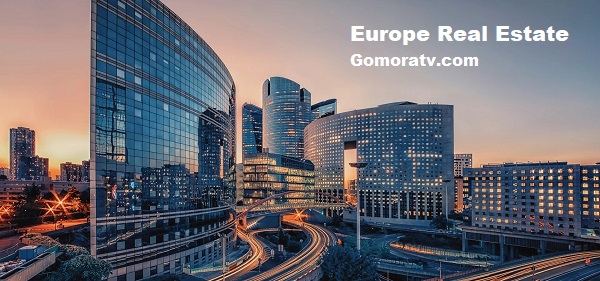Real Estate in Europe: A Detailed Guide
Real Estate in Europe: A Detailed Guide, Real estate options abound in Europe due to their varied landscape, which ranges from enormous Tuscan rural homes to little city apartments in Paris. Knowing the European real estate market is essential whether you’re thinking about purchasing a permanent house, a vacation property, or an investment property.

Market Dynamics:
Diversity: The European real estate markets exhibit significant regional and even intranational variations. Examine particular areas to understand costs, fashions, and laws.
Strong Demand: Major European cities like London, Paris, and Barcelona are experiencing tremendous demand, which may lead to competitive markets and higher prices.
Economic Conditions: Real estate markets can be greatly impacted by political stability and national economies. Examine the country you are targeting’s economic situation.
Types of Properties:
Apartments: The most typical kind of real estate in Europe, particularly in urban areas. Studios and large family units are among the available options.
Houses: In suburban and rural locations, single-family homes are more numerous than in city centers. Styles differ widely from place to place.
Villas: Luxurious standalone homes with private gardens or pools, often found in resort areas or the countryside.
Historic Properties: Europe is home to many old buildings, such as refurbished farmhouses and castles, which can provide a distinctive living environment but may also call for particular care requirements.
Investment Considerations:
Buy-to-Let: Income can be generated by investing in a rental property, but keep in mind that there may be vacancies and administrative expenses.
Also Read: US National Real Estate Companies
Capital Appreciation: In stable markets, property values might increase over time, offering long-term returns.
Regulations: Tax implications, rental restrictions, and renovation permits can vary. Research regulations in your target country.
Buying Process:
Find a Real Estate Agent: A local agent can assist with deal negotiations, legal navigation, and procedural guidance.
Offer and Negotiation: The offer process can be more informal than in some countries, with room for negotiation.
Legal and Financial Due Diligence: Extensive legal and financial due diligence is required. Engage a lawyer to guarantee a seamless transaction.
Closing Costs: Expect closing costs to include taxes, notary fees, and agent commissions.
Financing:
Mortgages: It can be harder for foreigners to get a mortgage than it is for locals. Examine available loans and the eligibility prerequisites.
Cash Purchases: Some countries have tougher mortgage requirements for non-residents, which may make cash purchases more alluring.
Additional Considerations:
Language Barriers: Language can be a hurdle. Consider hiring a translator if needed during the buying process.
Cultural Differences: The customs of European real estate may not be the same as those in your nation. Be ready to adjust and learn about regional customs.
Cost of Living: When assessing affordability, take recurring expenses such as utilities, property taxes, and upkeep into account.
Types of Properties in Europe:
Europe’s real estate smorgasbord offers a delectable variety of properties to suit any taste and budget. Here’s a glimpse at some of the most common types:
Urban Dwellings: Apartments are the ultimate living space in the center of vibrant European cities. These vary from large, multi-bedroom homes suitable for families to small, comfortable studios great for young workers. These flats are generally housed in charming ancient houses that provide your living area with a hint of European character.
Suburban Comforts: Homes and townhouses in suburban areas are available for those seeking a mix of city living and a more relaxed atmosphere. These residences occasionally provide more solitude than apartments, and occasionally they have small yards or private gardens. Modern suburbs usually have amenities like schools, parks, and easy access to public transit.
Rustic Retreats: The farms, castles, and villas of rural Europe entice you in. Although living in a castle offers a unique and historically rich experience, be ready for possible restoration needs. Villas offer an opulent retreat with lots of room and seclusion; they are frequently located in resort regions or on the outskirts of towns. Renovated and modernized farmhouses can be quaint options that provide a glimpse of country living.
Note: Investing in real estate in Europe can be a rewarding experience, but thorough research, professional guidance, and a clear understanding of the market are essential for success.